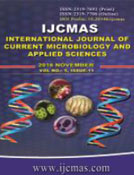


 National Academy of Agricultural Sciences (NAAS)
National Academy of Agricultural Sciences (NAAS)

|
PRINT ISSN : 2319-7692
Online ISSN : 2319-7706 Issues : 12 per year Publisher : Excellent Publishers Email : editorijcmas@gmail.com / submit@ijcmas.com Editor-in-chief: Dr.M.Prakash Index Copernicus ICV 2018: 95.39 NAAS RATING 2020: 5.38 |
Bovine milk proteins have been identified that possess broad spectrum antimicrobial activity. In vitro, these proteins upon degradation by digestive enzymes or microbial enzymes have been shown to release antimicrobial peptides (AMPs), which exhibit unique mechanism for killing bacteria compared with current antibiotics. These AMPs selectively binds to the outer lipid membrane of the bacterium and form blisters and pores, which eventually result in lyses of the cell leading to cellular death. Present research has been carried out to find out the minimal inhibitory effect of peptide released during fermentation under controlled condition on Staphylococcus aureus and Escherichia coli. Bioactive peptides generated during fermentation were separated using different techniques and tested for antimicrobial activity. These peptides first purified with gel filtration technique and then subjected to reverse phase high performance liquid chromatography. Broth dilution and well diffusion methods were used to determine the lowest concentration of antimicrobial peptides agent (minimal inhibitory concentration, MIC) that can inhibit the growth of selected pathogen; we find that under defined test conditions, AMPs inhibits the visible growth of the bacterium being investigated. This study demonstrated that bioactive peptides having antimicrobial acitivity generated during fermentation with L. helveticus showed a minimum of 8mm zone of inhibition against gram positive S. aureus and 9mm against gram negative E. coli on plates containing 20µl peptide concentration as compared to respective plates or broth tubes which determines the lowest concentration of the assayed antimicrobial peptide, minimal inhibitory concentration, (MIC). The amount of peptide as calculated for 20µl peptide suspension was 0.34 mg/ml. Therefore we can conclude that 0.34 mg/ml of may be considered as minimal inhibitory concentration for the inhibition of growth of S. aureus and E. coli. Further study and animal trials must be carried out to decide final dose of such peptide to be used for therapeutic agent or as in food preservation.
 |
 |
 |
 |
 |